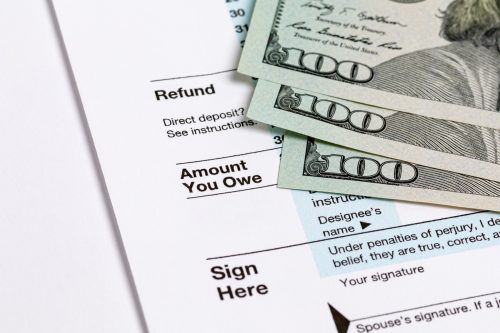IRS Warns That Trying to Lower Your Tax Bill Puts You at Risk of Paying Much More

We all hope for a refund after filing our tax returns every year, but many taxpayers end up finding out they owe money to the Internal Revenue Service (IRS) instead. With less than a month left to file, you may be frantically searching for a way to lower your tax bill. But don’t let scammers take advantage of your desperation. The IRS just issued a new warning to taxpayers looking for an easy way to reduce how much they owe in taxes. Read on to find out why the agency says you could be putting yourself at risk of paying even more.
READ THIS NEXT: IRS Warns That Claiming These Credits Can Get You Audited and Fined.
Refunds are smaller this year, and more people than usual may owe money.

If you’ve grown accustomed to receiving a hefty refund from the IRS, you might be disappointed this year. The agency has been warning that “refunds may be smaller in 2023.” As of March 18, the average refund amount was over 11 percent lower than it was in 2022.
“Several factors contribute to this. For example, taxpayers will not receive an additional stimulus payment with their tax refund because there were no Economic Impact Payments for 2022,” the IRS explained. “In addition, taxpayers who don’t itemize and take the standard deduction won’t be able to deduct their charitable contributions like they were able to on their 2021 returns.”
And some taxpayers may not receive any refund at all in 2023. “People should absolutely expect smaller tax refunds this year,” financial expert Lynnette Khalfani-Cox told NPR. “And frankly, some people might even owe the government money.”
The IRS has a program that can help taxpayers lower their bill.

If you weren’t expecting to owe money this year, you might find yourself unprepared to make that payment. But the IRS has options for taxpayers who have a tax bill they can’t pay. For some people, the Offer in Compromise program is a good option.
“An offer in compromise allows you to settle your tax debt for less than the full amount you owe,” the agency explains. “It may be a legitimate option if you can’t pay your full tax liability or doing so creates a financial hardship.”
When deciding whether or not to approve an offer in compromise application, the IRS considers several individual factors like your ability to pay, income, expenses, and asset equity. But not all taxpayers are eligible to apply, and the agency does not guarantee it will approve anyone’s application.
“Explore all other payment options before you submit an offer in compromise,” the IRS advises. “The Offer in Compromise program is not for everyone.”
RELATED: For more up-to-date information, sign up for our daily newsletter.
Scammers are working to take advantage of taxpayers exploring this option.

In a March 30 press release, the IRS issued a new warning to taxpayers looking to lower their tax bill through the Offer in Compromise program. According to the agency, con artists are working to take advantage of taxpayers exploring this option by pushing Offer in Compromise “mills.”
The IRS is including this scheme in its Dirty Dozen, which is an annual list that covers the “common scams” taxpayers are likely to encounter during the filing season.
“An Offer in Compromise ‘mill’ will usually make outlandish claims, frequently in radio and TV ads, about how they can settle a person’s tax debt for cheap,” the agency explained in its new alert. “In reality, the promoter fees are often excessive, and taxpayers pay the Offer in Compromise mill to get the same deal they could have received on their own by working directly with the IRS. This takes unnecessary money out of the taxpayer’s wallet.”
They also target taxpayers who aren’t eligible for an offer in compromise.

You may end up owing the same amount in taxes even if you pay the scammer’s fee. According to the IRS, Offer in Compromise mills will aggressively promote the program in misleading ways to people who aren’t even eligible to apply for it. This ends up “frequently costing taxpayers thousands of dollars,” the agency warned.
“Too often, we see some unscrupulous promoters mislead taxpayers into thinking they can magically get rid of a tax debt,” IRS Commissioner Danny Werfel said in a statement. “This is a legitimate IRS program, but there are specific requirements for people to qualify. People desperate for help can make a costly mistake if they clearly don’t qualify for the program. Before using an aggressive promoter, we encourage people to review readily available IRS resources to help resolve a tax debt on their own without facing hefty fees.”
You can check your own eligibility for the agency’s Offer in Compromise program at no cost through its online Pre-Qualifier tool. But as the IRS reiterated in its recent alert, “Not every taxpayer will qualify for an Offer in Compromise.”
Best Life offers the most up-to-date financial information from top experts and the latest news and research, but our content is not meant to be a substitute for professional guidance. When it comes to the money you’re spending, saving, or investing, always consult your financial advisor directly.
- Source: https://www.irs.gov/about-irs/the-2023-tax-season-has-begun-irs-offers-tips-to-accurately-file-your-return
- Source: https://www.irs.gov/newsroom/filing-season-statistics-for-week-ending-march-17-2023
- Source: https://www.irs.gov/newsroom/options-for-taxpayers-with-a-tax-bill-they-cant-pay
- Source: https://www.irs.gov/payments/offer-in-compromise
- Source: https://www.irs.gov/newsroom/dirty-dozen-watch-out-for-offer-in-compromise-mills-where-promoters-claim-their-services-are-needed-to-settle-irs-debts
- Source: https://www.irs.gov/newsroom/dirty-dozen